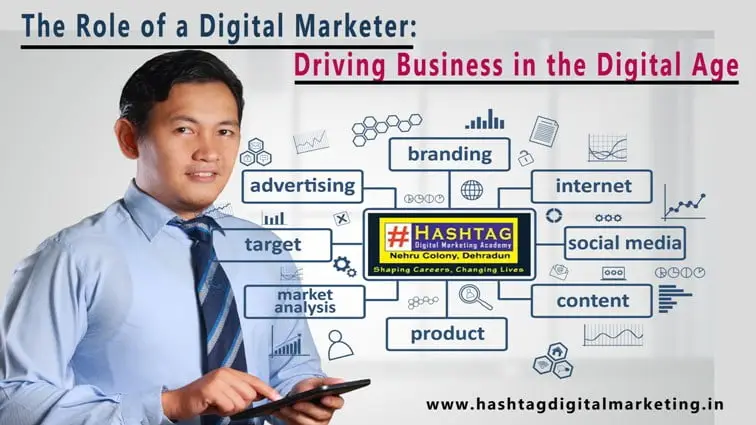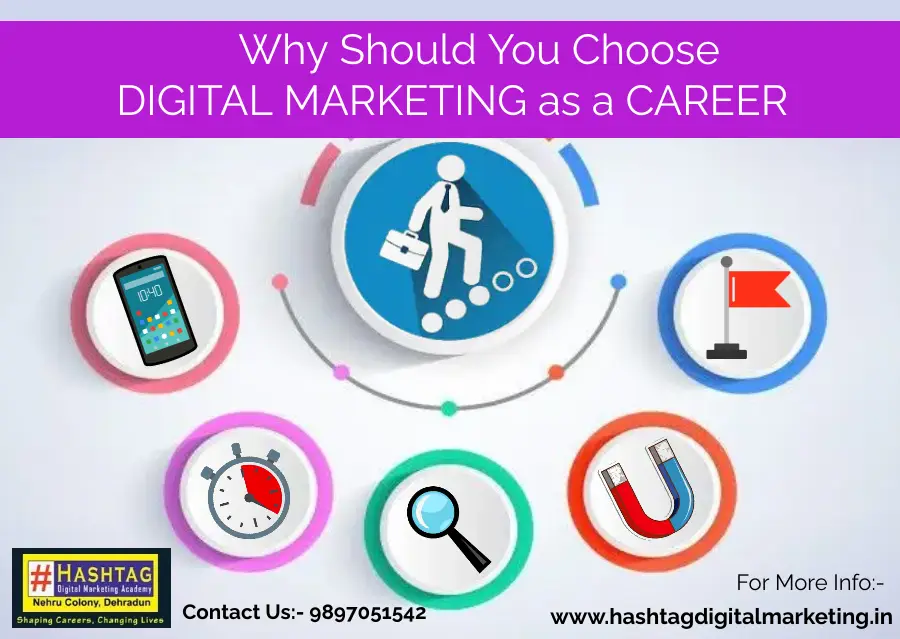
In today’s digital landscape, where technology reigns supreme, businesses are increasingly turning to digital marketing to establish their online presence, engage with customers, and drive growth. Digital marketing encompasses a wide range of strategies and tools designed to leverage the power of the internet and reach a global audience. In this comprehensive article, we will delve into the fundamental of digital marketing, explore its diverse applications across various channels, and uncover the vast career opportunities it presents.
Fundamentals of Digital Marketing:
Understanding Target Audience: The foundation of any successful digital marketing campaign lies in understanding the target audience. By conducting market research and analyzing data, digital marketers gain insights into customer demographics, interests, and preferences. This knowledge enables them to tailor marketing efforts effectively.
Compelling Content Creation: Content remains the backbone of digital marketing. Creating high-quality, valuable, and engaging content is crucial for capturing audience attention, establishing credibility, and fostering customer relationships. This content can take various forms, including blog posts, articles, videos, podcasts, infographics, and interactive media.
Search Engine Optimization (SEO): SEO is essential for improving a website’s visibility in search engine results pages (SERPs). By optimizing websites with relevant keywords, enhancing website structure and performance, and building quality backlinks, digital marketers can increase organic traffic and rank higher on search engines like Google.
Pay-per-Click Advertising (PPC): PPC advertising is a highly targeted and measurable form of online advertising. Advertisers bid for ad placements on search engines and pay a fee each time their ad is clicked. Platforms like Google Ads and social media advertising networks allow businesses to reach specific demographics and tailor their campaigns to maximize ROI.
Social Media Marketing: Social media platforms have revolutionized digital marketing by providing vast opportunities to engage with audiences and build brand loyalty. By creating compelling social media content, running targeted ads, and actively participating in online conversations, businesses can effectively reach and connect with their target customers.
Email Marketing: Email marketing remains a powerful tool for nurturing customer relationships and driving conversions. By building an email subscriber list and crafting personalized, relevant, and timely messages, businesses can deliver value to their audience, promote products or services, and drive engagement and sales.
Applications of Digital Marketing:
E-commerce: Digital marketing is pivotal for e-commerce businesses. Through strategic SEO, PPC advertising, social media marketing, and email campaigns, online retailers can drive traffic, increase brand visibility, improve conversion rates, and boost sales.
Content Marketing: Content marketing revolves around creating and distributing valuable, relevant, and consistent content to attract and retain a clearly defined audience. It encompasses blog posts, videos, podcasts, eBooks, and more. By delivering valuable information, businesses can build trust, establish thought leadership, and generate leads.
Mobile Marketing: With the widespread use of smartphones, mobile marketing has gained significant importance. Marketers leverage mobile apps, location-based targeting, SMS marketing, and mobile-friendly websites to reach and engage consumers on their mobile devices.
Influencer Marketing: Influencer marketing capitalizes on the credibility and reach of social media influencers. By collaborating with influencers who align with their brand values, businesses can tap into their loyal followers, expand brand awareness, and drive sales.
Career Scope in Digital Marketing:
Digital Marketing Strategist: As a digital marketing strategist, you will develop comprehensive marketing plans, oversee campaign execution, and analyze data to drive business growth and achieve marketing objectives.
SEO Specialist: SEO specialists optimize websites, conduct keyword research, analyze website performance, and implement strategies to improve organic search rankings and increase website visibility.
Social Media Manager: Social media managers create and implement social media strategies, manage social media accounts, curate engaging content, monitor performance metrics, and engage with the audience to enhance brand presence and drive customer engagement.
Content Marketing Manager: Content marketing managers are responsible for developing content strategies, overseeing content creation and distribution, ensuring brand consistency, and measuring content performance to attract and retain customers.
Email Marketing Specialist: Email marketing specialists design and execute targeted email campaigns, segmenting audiences based on demographics and behaviors. They optimize email content, analyze campaign performance, and leverage automation tools to drive conversions and customer retention.
Digital Advertising Manager: Digital advertising managers plan, execute, and optimize digital advertising campaigns across various channels, such as search engines, social media platforms, and display networks. They analyze campaign performance, adjust strategies, and maximize return on ad spend (ROAS).
Web Analytics Expert: Web analytics experts analyze website data using tools like Google Analytics, interpreting user behavior, tracking conversions, and providing insights to improve website performance and optimize digital marketing strategies.
E-commerce Specialist: E-commerce specialists focus on driving online sales through various digital marketing channels. They optimize product listings, implement conversion rate optimization strategies, and utilize digital advertising and remarketing techniques to enhance the online shopping experience and increase sales.
Digital Marketing Consultant: Digital marketing consultants provide strategic guidance to businesses, conducting audits, identifying opportunities, and developing customized digital marketing plans. They stay updated with industry trends and emerging technologies to deliver effective solutions to clients.
Conclusion: Digital marketing has revolutionized the way businesses connect with their target audience. By understanding the fundamentals of digital marketing, harnessing its diverse applications, and capitalizing on the ever-expanding online landscape, businesses can achieve remarkable growth and success.
Join digital marketing course in dehradun at Hashtag Academy to enter into the field of digital marketing that offers a vast array of career opportunities, where professionals can specialize in various areas and contribute to the dynamic and exciting world of online marketing. As technology continues to advance and consumer behaviors evolve, the scope for digital marketing professionals will only continue to expand, making it an excellent career choice for those passionate about creativity, data analysis, and driving business success in the digital age.



